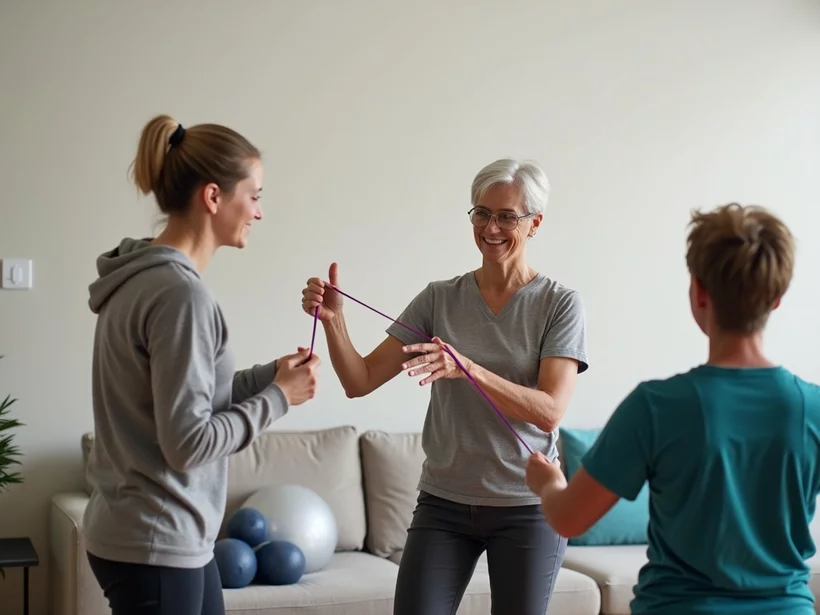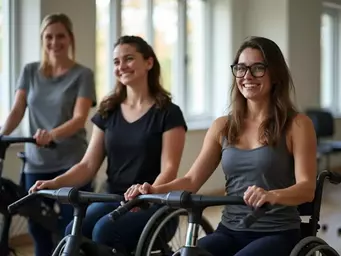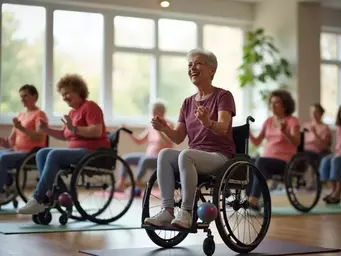NDIS and Exercise Physiology Insights

What if the key to transforming your health and well-being lies in a tailored movement program designed just for you? NDIS exercise physiology offers personalized solutions that empower individuals with disabilities to achieve their fitness goals and improve their quality of life. Let's delve into the essential insights from this transformative practice.
What You Will Learn
- NDIS exercise physiology is a personalized support system designed to enhance physical health for individuals with disabilities.
- Accredited Exercise Physiologists (AEPs) create customized exercise programs that align with each client’s unique physical capabilities and goals.
- Engaging in exercise physiology can significantly improve mobility, increase confidence, and support overall mental well-being.
- Exercise physiology plays a vital role in managing chronic health conditions, promoting a proactive approach to health and wellness.
- Understanding your NDIS plan and working closely with your AEP can help maximize your funding and access the right services.
- Functional capacity assessments are critical for developing effective, personalized exercise programs that enhance individual strengths and address limitations.
Key Benefits of NDIS Exercise Physiology
Engaging in exercise physiology offers numerous advantages, which can be categorized into four main benefits:
Enhancing Physical Function
Improves strength, balance, and endurance, leading to greater independence.
Supporting Mental Health
Reduces anxiety and depression, enhancing overall well-being.
Capacity Building in Daily Living Skills
Helps develop confidence and essential tasks for greater community participation.
Chronic Disease Management
Provides structured plans to manage chronic health issues effectively.
Understanding NDIS Exercise Physiology and Its Importance
When we talk about NDIS exercise physiology, what are we really referring to? It's all about using tailored movement programs to help individuals with disabilities achieve their goals. At Health Moves, we believe in the power of personalized exercise plans to improve not just physical health, but overall well-being. Let’s explore how this works and why it matters.
What is NDIS Exercise Physiology?
NDIS exercise physiology is a type of support funded by the National Disability Insurance Scheme (NDIS) that focuses on improving the physical health of individuals with disabilities. This service is delivered by Accredited Exercise Physiologists (AEPs), who are specially trained to create exercise programs tailored to each person’s unique needs. Imagine having a fitness coach who understands your challenges and helps you thrive through movement! For more detailed information on AEPs and their accreditation, you can visit the Exercise & Sports Science Australia (ESSA) website, which outlines the rigorous standards these professionals meet.
Defining the Role of Accredited Exercise Physiologists (AEPs)
AEPs play a crucial role in the NDIS framework by designing and implementing individualized exercise programs. They assess physical capabilities, set achievable goals, and motivate clients to reach their full potential. Here are some key responsibilities of AEPs:
- Conducting assessments to understand each client’s physical abilities
- Creating personalized exercise plans that align with NDIS goals
- Monitoring progress and making adjustments as needed
- Providing education on how to maintain a healthy lifestyle
Key Benefits of NDIS Exercise Physiology
Engaging in exercise physiology under the NDIS brings countless benefits beyond just physical fitness. At Health Moves, we’ve seen firsthand how these programs can transform lives! Here’s a look at some of the most significant advantages:
Enhancing Physical Function and Mobility Improvement
Physical activity is vital for enhancing mobility and functionality. NDIS exercise physiology helps clients regain strength, improve balance, and increase endurance. Think about it—better mobility means greater independence! This can open doors to new opportunities in daily life.
Supporting Mental Health and Coordination
Exercise has a wonderful impact on mental health, too. Regular physical activity can reduce feelings of anxiety and depression. AEPs not only focus on movement but also incorporate activities that enhance coordination and cognitive skills. This holistic approach ensures clients feel better both physically and mentally.
Capacity Building in Daily Living Skills
Exercise programs also play a role in developing daily living skills. By engaging in tailored activities, clients can build confidence and learn essential tasks. Here’s how exercise physiology helps:
- Encouraging participation in community activities
- Improving self-care routines through enhanced mobility
- Boosting social interactions by joining group classes
The Role of Chronic Disease Management in NDIS Exercise Physiology
Many individuals with disabilities also face chronic health issues, which is where exercise physiology becomes vital. AEPs help manage these conditions through structured exercise plans. This proactive approach can reduce health risks and improve quality of life for those living with chronic diseases. The Centers for Disease Control and Prevention (CDC) offers comprehensive data and resources on chronic disease prevention and management, further highlighting the importance of tailored exercise interventions.
In summary, understanding the importance of NDIS exercise physiology is just the first step in accessing these transformative services. At Health Moves, we are dedicated to helping you navigate this journey with confidence, ensuring you receive the tailored support needed to thrive!
Pro Tip
Did you know? Setting specific and measurable goals can significantly enhance your success with NDIS exercise physiology. Consider using the SMART criteria—Specific, Measurable, Achievable, Relevant, and Time-bound—to outline your fitness objectives. This approach not only clarifies your goals but also helps your Accredited Exercise Physiologist tailor your program effectively.
Frequently Asked Questions About NDIS Exercise Physiology
When you're stepping into the world of NDIS exercise physiology, it's completely normal to have questions. Understanding the process can feel overwhelming, but that's where we come in! At Health Moves, we strive to clear up any confusion and help you feel ready to take on your journey.
Let’s dive into some of the most common questions we encounter from participants like you. These FAQs will give you insight into what to expect and how to maximize the benefits of your NDIS funding.
Common Questions from NDIS Participants
- What is NDIS Exercise Physiology? NDIS exercise physiology is a specialized support service funded by the National Disability Insurance Scheme (NDIS) that provides tailored exercise programs to individuals with disabilities. These programs are designed to improve physical health, mobility, and overall well-being.
- Who delivers NDIS Exercise Physiology services? These services are delivered by Accredited Exercise Physiologists (AEPs), who are university-qualified health professionals with specialized training in designing and delivering safe and effective exercise interventions for people with chronic diseases, injuries, and disabilities.
- What are the main benefits of NDIS Exercise Physiology? Key benefits include enhanced physical function (strength, balance, endurance), improved mobility, better mental health (reduced anxiety/depression), capacity building in daily living skills, and effective management of chronic health conditions.
- How can I maximize my NDIS funding for Exercise Physiology? To maximize your funding, clearly communicate your goals with your AEP, regularly review your NDIS plan to ensure it aligns with your needs, and effectively communicate with your support coordinator regarding your exercise physiology services.
- What happens during a Functional Capacity Assessment? A Functional Capacity Assessment is an initial evaluation conducted by an AEP to understand your current physical abilities, limitations, and specific needs. This assessment is crucial for developing a personalized and effective exercise program tailored to your individual goals.
Resources for NDIS Participants
Finding the right resources can significantly enhance your understanding of NDIS exercise physiology. Here are some useful links and resources for you:
- NDIS Official Website – The best place to find comprehensive information about the NDIS.
- Exercise and Sports Science Australia (ESSA) – A valuable resource for understanding the role of exercise physiologists.
- Health Moves Resources – Check out our tailored guides and tools to help you navigate your NDIS journey.
These resources can help you feel more informed and empowered as you navigate your NDIS experience. Remember, staying connected with your AEP and accessing available resources is key to achieving your health goals!
Taking the Next Steps Toward Better Health
Now that you're more familiar with NDIS exercise physiology, you're ready to take the next steps! At Health Moves, we're here to support you through each phase of your journey.
Starting with exercise physiology services can seem like a big step, but it’s one of the best choices you can make for your health. Let’s explore how you can get started!
How to Get Started with NDIS Exercise Physiology Services
The first step in your journey is reaching out to NDIS-registered providers, like Health Moves. Here’s how you can initiate the process:
- Identify your goals and the areas you want to focus on.
- Contact a registered exercise physiologist to discuss your needs.
- Schedule your first appointment for an assessment.
By taking these steps, you'll be well on your way to creating a meaningful exercise program tailored to you!
Contacting NDIS-Registered Providers for Assistance
It's essential to engage with a provider who understands the NDIS system. Don’t hesitate to reach out to us at Health Moves! We’re here to answer your questions and guide you through the next steps. Together, we can develop a plan that empowers you to achieve your health goals.
Encouragement to Seek Support and Take Action
As you embark on this journey, remember that seeking support is a sign of strength! Whether it’s reaching out for help or talking about your experiences, you are not alone in this process.
Taking action is what leads to change. We encourage you to set realistic health goals and consider lifestyle modifications that can enhance your well-being. Here are a few tips for setting effective health goals:
- Start small – focus on achievable goals.
- Track your progress regularly to stay motivated.
- Celebrate your successes, no matter how minor!
Your journey towards better health through NDIS exercise physiology is within reach. At Health Moves, we're dedicated to supporting you every step of the way!
Recap of Key Points
Here is a quick recap of the important points discussed in the article:
- NDIS exercise physiology provides tailored movement programs to enhance the physical health and well-being of individuals with disabilities.
- Accredited Exercise Physiologists (AEPs) create personalized exercise plans based on individual assessments, goals, and progress monitoring.
- Key benefits include improved physical function, enhanced mental health, and capacity building for daily living skills.
- Chronic disease management is an essential aspect of NDIS exercise physiology, helping to reduce health risks and improve quality of life.
- Maximizing your NDIS funding involves clear communication with your AEP and understanding your plan's details.
- Functional capacity assessments are crucial for developing effective and personalized exercise programs.
- Taking the first steps involves contacting NDIS-registered providers and scheduling assessments to start your journey.








